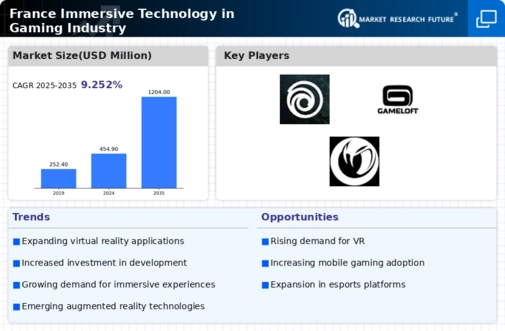The immersive technology-in-gaming-industry market in France is characterized by a dynamic competitive landscape, driven by rapid technological advancements and evolving consumer preferences. Major players such as Meta Platforms (US), Sony Interactive Entertainment (JP), and Microsoft Corporation (US) are at the forefront, each adopting distinct strategies to enhance their market positioning. Meta Platforms (US) focuses on expanding its virtual reality ecosystem, leveraging its Oculus brand to create immersive gaming experiences. Meanwhile, Sony Interactive Entertainment (JP) emphasizes exclusive game titles and innovative hardware, aiming to solidify its leadership in the console market. Microsoft Corporation (US) adopts a cloud-centric approach, integrating gaming with its Azure platform to enhance accessibility and user engagement, thereby reshaping competitive dynamics.
The business tactics employed by these companies reflect a concerted effort to optimize operations and enhance market presence. Localizing manufacturing and optimizing supply chains are prevalent strategies, particularly as companies seek to mitigate risks associated with global supply chain disruptions. The market structure appears moderately fragmented, with a blend of established giants and emerging players, collectively influencing trends and consumer choices.
In October 2025, Meta Platforms (US) announced a strategic partnership with a leading French game developer to co-create exclusive VR content. This collaboration is poised to enhance Meta's content library, potentially attracting a broader audience and reinforcing its competitive edge in the immersive gaming sector. The strategic importance of this partnership lies in its ability to leverage local expertise, thereby tailoring experiences to the French market.
In September 2025, Sony Interactive Entertainment (JP) unveiled its latest VR headset, which features advanced haptic feedback technology. This innovation is expected to elevate user immersion, setting a new standard in the gaming experience. The introduction of this product not only showcases Sony's commitment to innovation but also positions it favorably against competitors, as it seeks to capture a larger share of the growing VR market.
In August 2025, Microsoft Corporation (US) expanded its Xbox Game Pass service to include a wider array of immersive titles, enhancing its value proposition to gamers. This move is strategically significant as it aligns with the growing trend of subscription-based gaming, allowing Microsoft to attract and retain a diverse user base while fostering loyalty through continuous content updates.
As of November 2025, current competitive trends in the immersive technology-in-gaming-industry market are increasingly defined by digitalization, sustainability, and AI integration. Strategic alliances are becoming pivotal, as companies recognize the need for collaboration to drive innovation and enhance user experiences. Looking ahead, competitive differentiation is likely to evolve, shifting from traditional price-based competition to a focus on technological innovation, supply chain reliability, and the ability to deliver unique, immersive experiences that resonate with consumers.














Leave a Comment